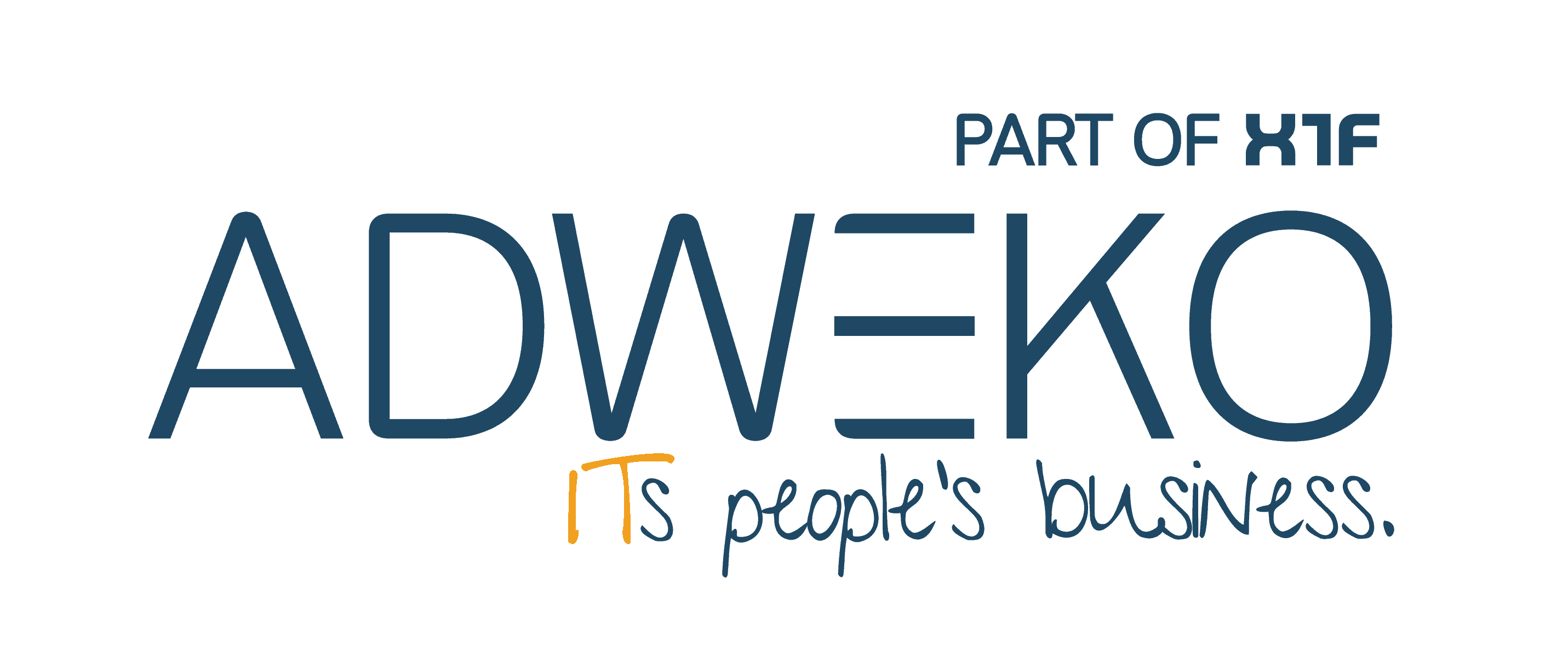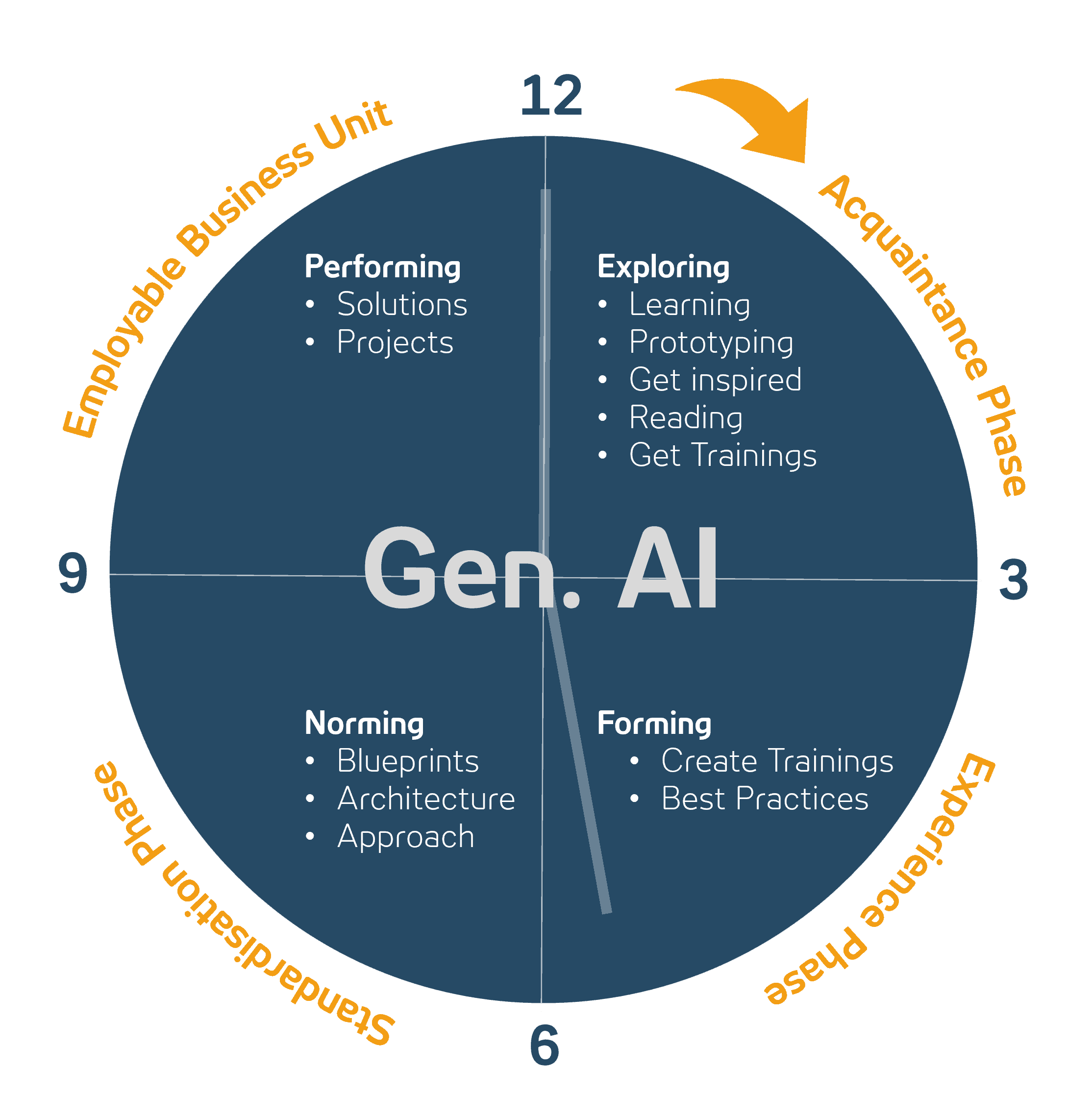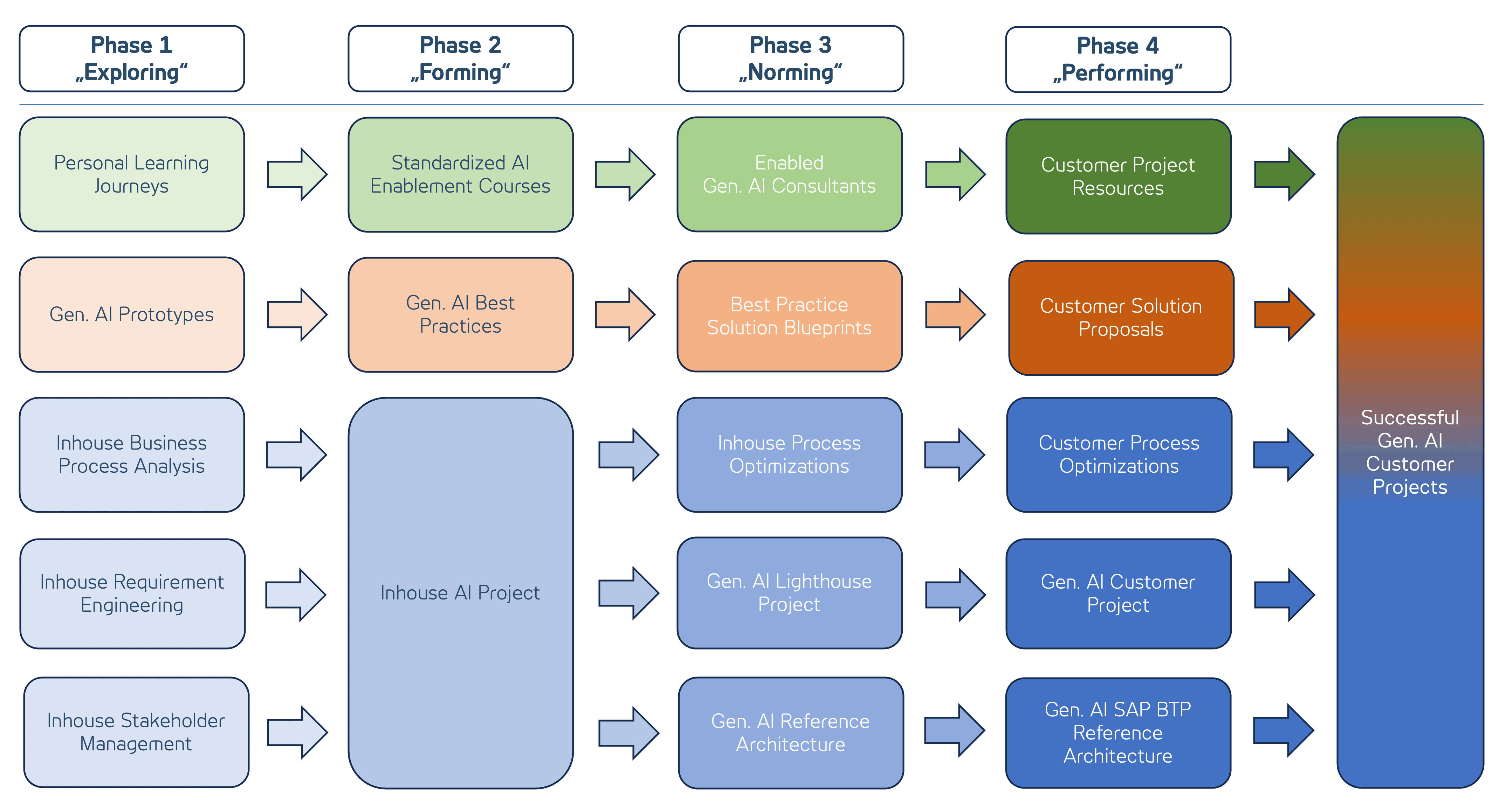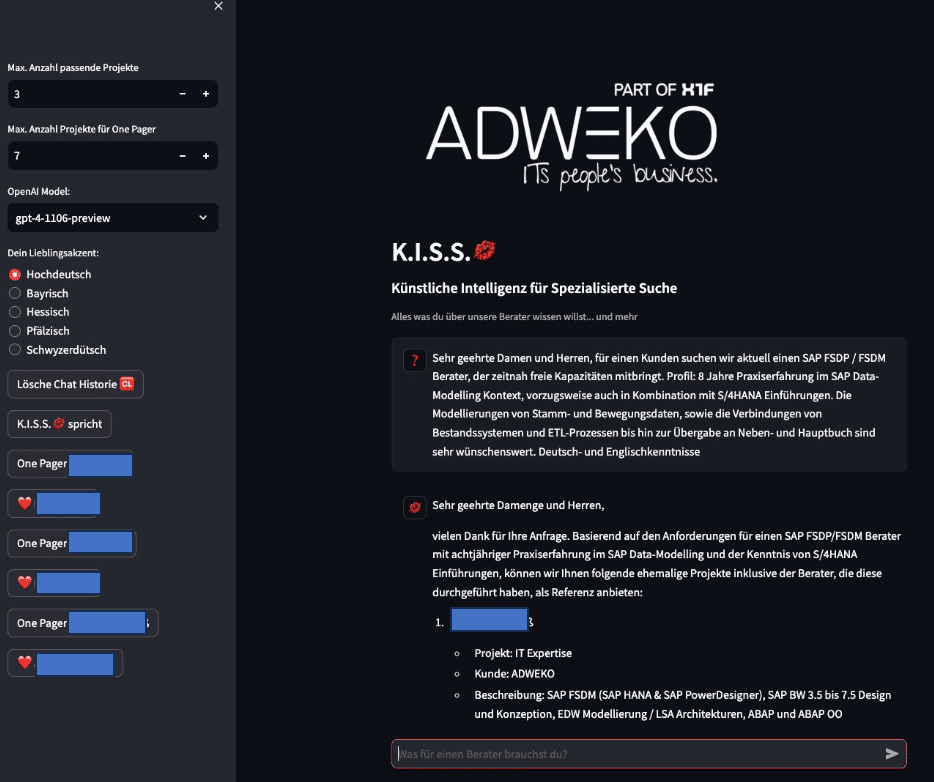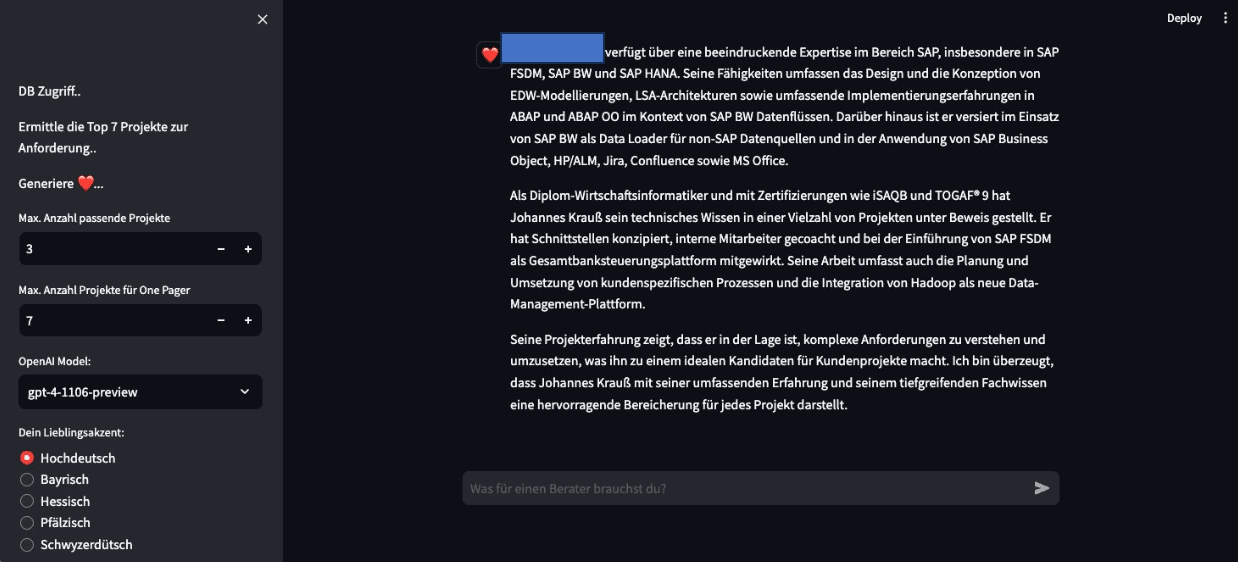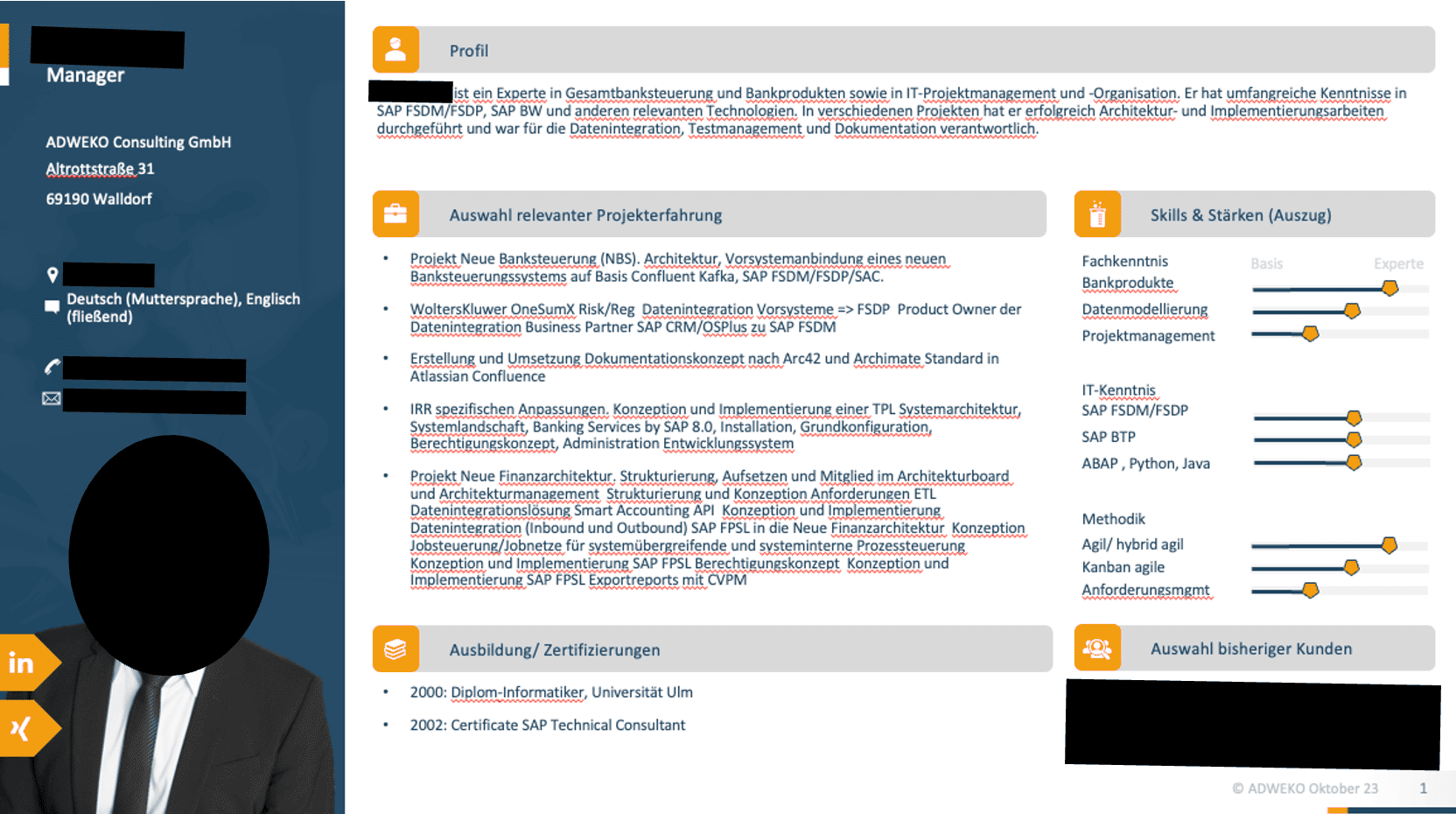ADWEKO AI Enablement Initiative
Generative AI helps IT consulting companies in the financial services sector to develop more efficient and intelligent solutions, giving clients a significant competitive advantage.
Building internal expertise is crucial to ensure that AI solutions can be implemented and managed effectively and that they meet the specific requirements and objectives of the company in question. This requires a certain openness to innovation and adaptation to the dynamic landscape of the financial services industry.
We at ADWEKO have launched the “ADWEKO AI Enablement Initiative” into being: A program to build internal Generative AI know-how to educate and train our employees to henceforth provide our customers with the support and understanding for projects using Generative AI technology.
In order to build up enablement efficiently and competently, we use the 4-phase model as a theme clock:
“We attach particular importance to the high-quality training of our consultants.
Our 4-phase process model takes into account the individual preferences and talents of our consultants through the learning journeys as well as the ideal preparation for customer projects through our in-house project ‘AI4Sales’, which is structured exactly like a customer project (with the Sales department as a stakeholder).
The project results are then used productively by our sales team at ADWEKO.”
Daniel Ring, Topic Lead Gen. AI, ADWEKO Consulting GmbH
4-phase model for team enablement
The initiative consists of 4 phases that provide a guideline for our consulting teams to efficiently and competently set up and implement enablement.
EXPLORING – ACQUAINTANCE Phase
During the introductory phase, our consultants familiarize themselves with the technologies. As part of individual learning journeys, prototypes are created, analyzed and a wide variety of current AI approaches are explored. By completing training courses, our own findings are then supplemented. Each employee documents their own learning progress internally in Confluence blogs, Jupyter notebooks and Github repositories. This means that other employees can easily use these findings at any time to further their own learning progress.
What is Confluence, Jupyter & Github?
Confluence is a workspace for teams where knowledge and collaboration come together. It allows you to create, capture and collaborate on dynamic pages related to projects or ideas. It also structures and organizes tasks so that team members can access institutional knowledge and work together efficiently.
Jupyter Notebooks are web applications that enable developers and data scientists to create and share documents containing code, equations, visualizations and text.
GitHub is an online service for software development and version management for software projects based on Git.
Forming – Experience Phase
During the forming process, the knowledge gained is transformed into specific training plans so that, in future, customized training can be provided for each employee according to their level of knowledge. Approaches that work are documented as “best practice” guides.
Norming – Standardization Phase
In the standardization phase, “solution blueprints” for future projects are created from the previous results and functioning prototypes. The architectural approaches created in the process are compiled into a Gen. AI reference architecture in order to provide a proven and functional approach for new projects. General solution approaches can be derived from the prototype projects in order to create customer-specific solution proposals.
Performing – Employable Business Unit
The trained employees can now be successfully deployed in customer projects. Our architectures are used for the efficient implementation of our solution blueprints and proposals in customer projects.
4-phase model overview and components
The content components of the 4 team enablement phases build on each other and thus enable consistent, step-by-step enablement in the subject areas.
-
Employee training/Project Resources
-
Solution Design/Solution Proposals
-
Process analysis and optimization/Process Optimizsations
-
Gen. AI Project approach, Reference project/Projects
-
Gen. AI Architecture/Reference Architecture
Together, all these elements promote in-depth and sustainable learning and prepare our employees ideally for customer projects.
In-house project “AI4Sale”
Vision
“I want an AI application that has knowledge about our employees, their skills and my company’s projects.
I submit project tender documents to the AI application and it creates the required tender documents, documents and a tender handout for the tender team.”
Explanation
To explain the vision, here is an explanation generated directly via Bing Copilot (slightly shortened):
“Our AI project aims to use Generative AI to create a bid document from a project tender that contains all the company’s knowledge about projects, employee project, skills, pricing, etc. (…)
Our AI project uses Generative AI to automate the process of creating a bid document from a project tender. It works as follows:
It analyzes the project tender and extracts the relevant information such as the requirements, specifications, evaluation criteria and submission guidelines.
It searches the company’s database and retrieves the relevant knowledge about projects, employee projects, skills, prices, etc.
It summarizes the information and knowledge in a coherent and convincing proposal document that meets the expectations of the potential customer.
It creates a summary of the proposal document, highlighting the key points and benefits of the project or service.
Our AI project has several advantages over the conventional manual creation of a quotation document. Some of them are:
It saves time and resources by reducing the amount of work and human error involved in creating a quotation document.
It improves quality and consistency by ensuring that the bid document meets industry and company best practices and standards.
It increases customer satisfaction and loyalty by providing a proposal document that is tailored to the customer’s needs and preferences.”
Our prototype: K.I.S.S.
Our prototype K.I.S.S. stands for “Artificial Intelligencefor Specialized Search” – in our case, the specialized search for the perfect match between the project tender and the existing skills and competencies in the company.
This prototype demonstrates the ability to extract information from Word CVs and present it in a structured way, even if these CVs are collected on an individual consultant basis. Initialization in the context of prototyping succeeds in the following points:
- The existing CVs in Word format are read in via Wordscraper
- The content is structured using Gen. AI, as the CVs are recorded individually for each consultant
- The content is converted into a format that can be processed by AI using embedding and stored in a database
The application was developed via
Streamlit
-web application as a chatbot.
The
Users its requirements as text input, whereby then the matching consultants via “ Similarity search” in the database and by “Retrieval Augmented Generation” to the Gen. AI via “Retrieval Augmented Generation”. All relevant information such as the requirements, specifications and evaluation criteria are extracted. The Gen. AI retrieves the relevant knowledge about employee projects, skills, etc.
The user can now
- Generate a letter of recommendation as text output according to user requirements
- a one-pager template in PowerPoint format with the appropriate skills, profile, etc.
What is Similarity Search and Retrieval Augmented Generation?
Similarity Search is a search method that retrieves objects based on their similarity to a query object instead of searching for exact matches. The retrieved objects do not have to be identical to the query object, but similar to it, based on predefined criteria.
Retrieval Augmented Generation (RAG) is an advanced artificial intelligence technology that combines information retrieval with text generation. An AI model can retrieve relevant information from a knowledge source and incorporate it into the generated text.
Secure your free demo appointment now!
Our approach enables a targeted and efficient search for specialized information, whether for recruitment, research or other applications that require high-quality and precise data. The in-house approach of the “AI Enablement Initiative” establishes above all a sustainable and competent AI business unit in our consulting firm.
Save time and resources by using Gen. AI reduces the amount of work and human error involved in creating a quotation document.
Improve quality and consistency by Gen. AI ensures that the proposal document meets industry and company best practices and standards.
Increase customer satisfaction and loyalty by using Gen. AI delivers a proposal document that is tailored to the customer’s needs and preferences.


